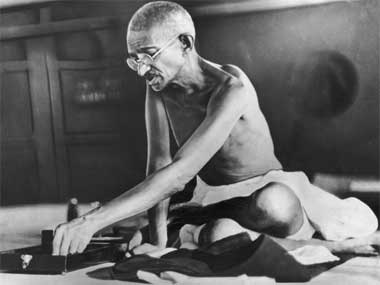By Kartikeya Tanna “The mother of Parliaments (a reference to the British Parliament) is like a sterile woman and a prostitute. Both these are harsh terms, but exactly fit the case. The natural condition of that Parliament is such that, without outside pressure, it can do nothing. It is like a prostitute because it is under the control of ministers who change from time to time”__. These are not the words of a living individual agitated over where the UPA has landed the country in. These remarkably strong thoughts were expressed over 90 years ago by an increasingly important and relevant human being who walked our nation’s soil. Gandhiji’s rather strong description in Hind Swaraj came without any fore-knowledge of the utter helplessness of present day politics in the age of coalition dharma, rendering the executive and other institutions sterile and docile. He further said, with an alarming degree of prescience: “Parliament is without a real master. Under the Prime Minister, its movement is not steady but it is buffeted about like a prostitute. The Prime Minister is more concerned about his power than about the welfare of Parliament. His energy is concentrated upon securing the success of his party. “If they [Prime Ministers] are to be considered honest because they do not take what are generally known as bribes, let them be so considered, but they are open to subtler influences. In order to gain their ends, they certainly bribe people with honours. I do not hesitate to say that they have neither real honesty nor a living conscience.” If Gandhiji had such strong views about Westminster democracy and government, which is what we have here, too, what were the alternatives he proposed? [caption id=“attachment_322124” align=“alignleft” width=“380” caption=".Getty Images"]  [/caption] Essentially, Gandhiji believed that freedom for each individual was the true conception of “freedom” rather than independence to a geographical territory like India. This, therefore, required a far greater degree of deference and autonomy to the individual than that given today. The individual had to be a proximate architect of his own government. He, therefore, insisted on a highly decentralised system. In political terms, Gandhiji wanted each of India’s 700,000 villages to be organised according to the will of its citizens. Each village would, thereafter, have one vote and would elect district administrations which, in turn, would elect provincial administrations which, in turn, would elect a president, a national chief executive. Centralisation, however, was inevitable amid the rising wave of nationalism that erupted in the last decade of the increasingly oppressive and callous British rule and the first few years of post-partition independent India, when the country had to be kept together. Thus began the process of annexation of over 500 princely states into the Union to form a state. And the founding fathers considered the Westminster model most appropriate. Accepting the inevitability of the Westminster form of government, Gandhi made repeated pleas to Congressmen to have grassroot workforces in each community and region to at least ensure the closest possible visibility of the party in the entire nation. As Gandhi himself observed back then – and that is true till date with the latest Congress debacle in Uttar Pradesh – a large number of Congressmen focused on garnering powerful political positions, almost as a natural entitlement to their sacrifice for swaraj. Grass-root workforces became purposeless. The emergence of regional parties was another phenomenon which has undergone a rather sorry metamorphosis during UPA-2. The first decade of independent India saw the nation, by and large, paying obeisance to the central source of authority led by Nehru and Patel. However, fissures in the nationalistic bond started gaining visibility soon thereafter with some regions rejecting aggressive governmental interference in almost every quarter of their lives. This often witnessed bloodshed and gore between an overbearing Centre and belligerent regionalism. Slowly, however, realising the futility of focusing solely on extending regional rights, most regional representatives have reduced themselves to ambitious aspirants of power. True, Gandhiji’s desire for devolving power downwards began to be realised with the emergence of regional parties. However, many of those responsible for recent corruption scandals as well as stifling major governmental reforms have been regional representatives elected by regional voters for advancing regional causes in New Delhi! And, amidst the trading of ministerial portfolios witnessed after each Lok Sabha election, Gandhiji’s villages continue to oscillate between ambitious regional representatives and an indifferent Centre in their struggle for attention. It must be stated, however, that criticising the Westminster model as a whole would be akin to throwing the baby out with the bathwater. In fact, in the 65th year of independent India, it would be rather impractical. Western-style institutions have played a significant role in increasing the world’s interest in engaging with India, with foreign entities contributing to the nation’s growth. In decrying UPA’s dismal performance, this crucial role of our institutions cannot be denied. However, given the rather dim reality revealed on the occasion of UPA-2’s third anniversary, it would do the country (though, perhaps, not itself) a great service by re-reading the Mahatma. Strong and decisive leadership at the top, sole focus on meaningful governance, due deference to federalism and cooption of states, clarity in policies and integrity in dealing with allies is what can begin to restore confidence of the nation in its governments. The UPA must begin the process of proving to its biggest critics that if governments have integrity and conviction, India’s choice of her democratic system is unimportant. Only a few states are already showing it.
Gandhi was not a great admirer of Westminster-style democracy. His fears are reflected in how the current UPA is performing.
Advertisement
End of Article
Written by FP Archives
see more


)

)
)
)
)
)
)
)
)



